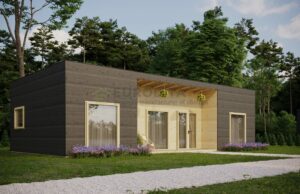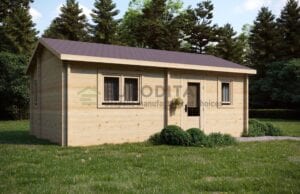Legislation surrounding log cabin building permits is extremely varied depending on the country. Laws have been set up in accordance to land’s history and customs. In this post – and in future ones – we at Eurodita have decided to look into legislation of several European countries. We will put together a comprehensive block of information into concise format. This way, you and your customers will stay informed.
Starting with Ireland, its building planning system was first introduced on the 1st of October, 1964. It came into affect under Local Government Act – or Planning and Development act. Under this act, log cabins for sale did not need a planning permission if they met the following criteria:
- They were under 25 sq. m. in size;
- They were free-standing, i.e. did not require a foundation;
- They were non-habitable garden houses;
- Or they were first-time building extensions, no more than 40 sq. m. in size.
All bigger options, or contemporary log cabins that can be considered a permanent dwelling, will need separate planning permissions. According to this list, there are quite a few glulam log cabins, garden sheds and even mobile houses that fit this criteria. Eurodita’s catalogue is always updated with our newest designs.
A few notes on log cabin planning permission. The distinction between fit for human habitation and not is an important point. If the cabin sits in your back yard and you simply work in it, it does not mean it’s fit to be lived in. Even more so if it doesn’t exceed 25 sq. m. However, if the cabin of that size will be used for permanent living, it will for sure need a planning permit, despite its size. We always recommend consulting with the local Irish planning permit authority, to make sure about their distinction and possible exceptions.

If you do end up needing a planning permission, your local authorities will be able to issue it. Any structure that can be considered a permanent dwelling will need such permit. Contemporary log cabins like Windermere, larger modular log homes like Dreamer will need to be registered as fit for human habitation.
But in case you are refused a building permit, do not back down. Ireland has an independent 3rd party planning appeals court. It’s one of the few European countries that do have this system. It’s operated by the Planning Appeals Board – An Bord Pleanala – and they deal with planning permission appeals exclusively.
For log home suppliers in Ireland, looking to attract more customers, consider offering aid in applying for permit. Your customers will be happy to receive all information regarding their bespoke log cabins, they are sure to refer you as a trustworthy supplier. It also wouldn’t hurt to build a relationship with local authorities, especially if you operate in a smaller region of Ireland. Familiarise yourself with local planning requirements so you can deliver quick and concise information to your customers.

As a disclaimer, we cannot say that the above regulations from the Local Government Act will apply to every individual case. The circumstances are unique in every application and should be consulted before application. While Eurodita is a reliable and long-standing log cabin manufacturer, we cannot boast to be expert of legislation of each country. That is why we urge our current and future partners to invest in this knowledge and help your clients purchase their dream glulam log cabins.

